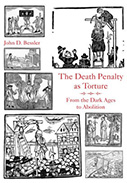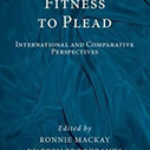The Death Penalty As Torture: From The Dark Ages To Abolition

Author: John D. Bessler
Publisher: Durham, NC: Carolina Academic Press, 2017. 460p.
Reviewer: Mary Welek Atwell | March 2019
John D. Bessler, a law professor who teaches at the University of Baltimore and Georgetown University, argues in 350 pages buttressed with copious notes, that the death penalty as it exists today is a form of torture that should be abolished. He maintains that it runs afoul of international law and treaties as well as the laws of all the nations that prohibit torture. It is an interesting argument that could offer a powerful approach to ending capital punishment. Unfortunately, in my view, Bessler does not succeed in persuading the reader. He makes the case that historically executions have often been brutal to the point that modern observers would find them agonizing. He further claims that attitudes about acceptable punishment have evolved and continue to do so. These points, that attitudes toward capital punishment are characterized by “evolving standards of decency,” are unarguable. However, his assertions that governments will arrive at an understanding that the death penalty should be abolished because it qualifies as a form of torture seem unsupported.
Unlike many legal scholars in the United States, he does not subscribe to the position that the “death row phenomenon”—the long wait on death row where inmates often experience prolonged physical and psychological suffering—is itself a form of torture. Rather he finds torture in both the process of sentencing a person to death and in the actual execution itself, no matter what method is used. He offers two arguments to reach this conclusion. First, he asserts that if non-state actors make threats of death, they are engaging in torture; and secondly, much more suffering is caused by an actual death sentence than by a mere threat. He concludes, therefore, that state-sanctioned sentencing to death is a form of torture. Secondly, he asserts that many of the non-lethal acts that are classified as torture cause less pain than the implementation of an execution. Therefore an execution, in which a defenseless person is killed, must meet the criteria for torture.
He contends that law—both domestic and international—should move toward a universal agreement in support of that opinion. Eventually that prohibition of capital punishment will, in his view, assume the status of jus cogens, a norm of international law, like proscriptions on slavery or piracy. But this outcome seems quite unlikely. It will happen only if lawmakers and judges, including those in the United States, come to equate the death penalty with intentionally and needlessly inflicting severe pain on an individual. They may agree with Bessler that torture is never justified or permissible, but at present they do not include capital punishment within that definition. Other than by repeatedly stating his argument, the author does not explain how that change of mind and heart is to be accomplished. I do not think it will happen as a result of reading this book.
Bessler sweeps through a lot of history and many parts of the world in this work. This portion of the book would benefit from better organization and better editing. He begins with a chapter on the dark ages that moves back and forth, from century to century, from continent to continent in a confusion of examples that frequently slides into a consideration of the Enlightenment and the Victorian era—a discussion that seems out of place in a chapter on the “dark ages.” A chapter on the Enlightenment follows. Bessler has written an earlier book on Cesar Beccaria, so it is no wonder that he devotes a fair amount of attention to that political philosopher and his opposition to capital punishment. However, it is puzzling to find careless editing in this section. For example, the exact same quotation from Frederick II about Beccaria is cited on p. 38 and repeated verbatim on p. 39. It is true that in the West, the Enlightenment era saw penal reforms and changes in the criminal law. Punishments were less publicly brutal but with the development of penitentiaries physical cruelties, including hangings, moved inside the prison walls outside of public scrutiny. Did people become less willing to inflict pain on others or did respectable citizens just not want to see it themselves? Bessler believes that although reforms in the eighteenth and nineteenth centuries reduced the use of corporal and capital punishment, states became more likely to use psychological methods to discipline their people. Thus the apparent reduction of physical cruelty may have only masked the wider use of mental cruelty and despite superficial changes and torture remained a mechanism of control.
The real decline in the acceptability of both torture and capital punishment has developed since the mid-twentieth century. In the period since World War II, nations have formalized many norms of customary law through treaties, international courts, and the work of the United Nations. Included are some international jus cogens rules “from which no derogation is permitted.” In other words, they are rules that prevail over and invalidate laws and agreements, even if countries try to deny their force. Violations of jus cogens are prohibited. But what if nations ignore the rules? It is not clear that there are consequences. The International Court of Justice has found that torture is prohibited, but they have not said the same about the death penalty. American courts certainly have not taken that position. They have strenuously defended the practice against international policies and criticisms, even as the nation remains an outlier among modern democratic countries. Bessler is correct that popular enthusiasm for capital punishment in the United States has waned rather dramatically in recent years, but there is little evidence that the diminished support has much to do with his argument that it is a form of torture. And here lies the critical gap in his thesis. The U.S. Supreme Court does read the Eighth Amendment prohibition of cruel and unusual punishment as outlawing torture. The U.S. has signed agreements forbidding the use of torture. But there is virtually no evidence that if the Court were to find the death penalty unconstitutional, they would do it on the grounds that it is a form of torture. Bessler may believe passionately that they should do so, but so far those who will need to make the decision do not agree with his thinking.
Mary Welek Atwell, Professor Emerita of Criminal Justice, Radford University


